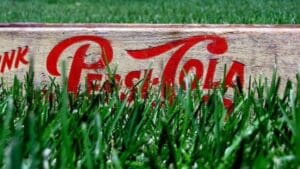From Medicine to Menace: What Happened to Soda?

It’s estimated that 1 in 10 Americans drinks soda at breakfast. While that may sound a little strange, Coca-Cola was actually formulated as a coffee alternative. In fact, sodas were created for medicinal benefits. But, these once healthful tonics are now the source of more than 40 percent of all sugar consumed in the United States. In 1900, Americans drank an estimated 12 bottles of soda per person per year; today it’s 555 cans. Per. Year. How did this happen?
The healing powers of effervescent natural mineral water were easy to recognize, and in the 1700s, many Americans believed drinking mineral water could treat gout, arthritis, digestive discomforts and a number of other ailments. By 1767, a man named Joseph Priestley learned how to “create” mineral water by a process called “impregnating water with fixed air.” In other words, carbonation was born. This carbonated soda water was flavored with real fresh fruit and nut syrups often unique to the pharmacy or the burgeoning hangouts known as soda shops that created them (kind of like Facebook, but with soda!).
The rest of the soda story goes a little something like this: Best formulas get mass-produced, clever marketers build brand identity, continued innovation and emotional bonding efforts forge decades-long relationships with consumers who would rather drink nothing at all than sip a competing product. The Cola Wars are perhaps the single greatest demonstration of successful capitalism and consumerism through the ages, even though the products today barely resemble their original intention.
Diet sodas make up 30 percent of the soda market (and rely on toxic sugar substitutes), but the other 70 percent consumed is loaded with high fructose corn syrup (which replaced sugar in most formulas in the 1980s), and is linked to the big rise in diabetes, obesity and other health issues plaguing Americans ever since it was added.
While the original formulations for Dr. Pepper, Coca-Cola and Pepsi-Cola are still in use today and contain ingredients with known medicinal benefits, the over-consumption of the excessively sweetened and/or toxic artificial sweeteners erode any therapeutic effects. But don’t count out soda completely. It still has value, and there are some brands worthy of supporting should you need or desire the bubbly delivery system of herbs:
Reed’s Ginger Brew: A natural food staple, this brand infuses real, pungent ginger and natural sweeteners. Ginger is known to help settle the stomach, relieve inflammation and boost circulation.
Taylor’s Tonics: Using traditional brewing methods, these tasty cola offerings infuse powerful tonic herbs such as cardamom and ginger with black tea, real vanilla and cane juice.
Virgil’s Root Beer: Micro-brewed with highest quality ingredients including anise, nutmeg and real sweet birch, the taste and the power is noticeably superior to any other root beer on the market.
Keep in touch with Jill on Twitter @jillettinger
image: Just Another Wretch

